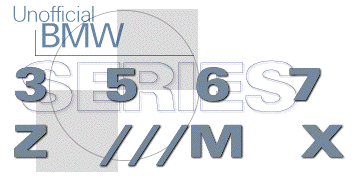|
Home
E12
E24
E28
E30
E34
E36
Z3
E39
E46
X5/E53
ALL
Ron Stygar
Carl Buckland
Dale Beuning
Forums
Help

From digest.v7.n69 Thu Aug 7 15:59:58 1997
From: Randy Hubbard <raceware_at_wwnet.com>
Date: Thu, 07 Aug 1997 16:36:43 -0400
Subject: Re: Minor Correction, But Important!
Jim,
I need to make a couple corrections in your post because they can cause
serious damage to the uninformed...
Unless indicated otherwise, the torque specifications listed in the
automotive industry, are for threads LUBRICATED with 30 weight standard
petroleum based oil. (No synthetics). Fasteners should not be installed
dry unless specifically indicated with the torque spec.
The second point is that most if not all car manufacturers carefully
examine the torque specs of a fastener and it's intended application.
While many times the specs *recommended* by a fastener supplier are
retained, often times the torque is application specific to prevent
undesirable localized distortion, etc. You example of aluminum is a
typical example where a LOWER torque than the bolt is capable of
sustaining, is required to prevent stripped threads in the aluminum.
Regards,
On the 'Bahn,
Randy, a.k.a. BoltMeister
NEW** VW/Porsche/BMW Interest At: http://www.wwnet.com/~raceware **NEW
>
> From: "James A. Ruffner" <jar7u_at_avery.med.virginia.edu>
> Date: Thu, 7 Aug 1997 10:05:28 -0400 (EDT)
> Subject: <OT> Anti-sieze compunds, etc.
> snip
> Anti-sieze compounds are designed primarily to be
> non-washable/non-oxidizable. Gease, over time, does oxidized and harden,
> especially under heat. This is one of the prime reasons you change the
> oil in a car. It slowly oxidizes to an acidic form, which will eat
> especially the bronze/aluminum/copper parts. This is also why one should
> change the oils in trans and differentials every 25,000 mi. This also
> includes grease/oil put on wheel studs (lug nuts.)
>
> However, anti-sieze usually is particulate lead or aluminum blended into a
> special high-temperature grease. It does lower the coefficient of
> friction in the threads. The excellent point is that it prevents the
> buildup of even low level corrosion, so subsequent removal is quite easy.
>
> As Randy comments, original torque specs, as supplied by the manufacturer,
> are to be used under their specified conditions. However, the general
> rule is that these specs are those privided by the makers of the bolts and
> studs to the auto maker, and are only passed on by the auto maker to the
> repair specs. As a rule, all torque specifications are for DRY,
> NON-LUBRICATED THREADS. As a consequence, most individuals, when
> re-assembling engines, transmissions, etc., over torque the bolts!
> However, keep in mind that exact torque is truly critical in only a few
> areas: internal engine parts such as rod bold, main bearing caps, etc.,
> and head bolts, overhead cams, etc.
>
snip
> Jim
>
>
> ------------------------------
Unofficial Homepages:
[Home]
[E12]
[E24]
[E28]
[E30]
[E34]
[E36]
[Z3]
[E39]
[E46]
[X5/E53]
[ALL]
[ Help ]
|

